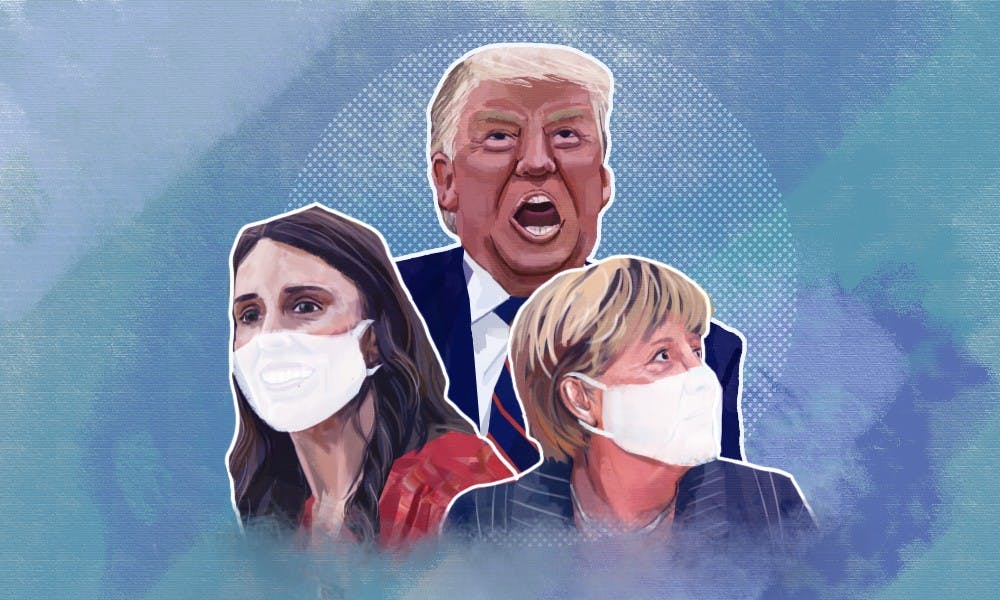
“The situation is serious; take it seriously,” Angela Merkel, Chancellor of Germany, implored on March 18 during one of her few national televised addresses.
“Stay home, save lives,” said Jacinda Ardern, New Zealand's Prime Minister, as she imposed harsh restrictions while promoting a compassionate approach to fighting COVID-19.
“And we’re prepared, and we’re doing a great job with it. And it will go away. Just stay calm. It will go away,” President Trump bragged on March 10. By the 18th of May, the United States reported over 89,000 COVID-19 related deaths, contradicting the president’s stance that the virus would simply “go away.”
The differences among the above leaders are stark and embarrassing. Two of them have centered their responses to this unprecedented crisis on communal responsibility and care for their fellow citizens, bringing the political decisions of their nations into the personal realm of human compassion and sensitivity — two things that aid Germany and New Zealand well as they fight the common enemy.
The other leader refuses to acknowledge compassion and sensitivity as essential doctrines of leadership, instead relying on the unsuccessful and toxically masculine buttresses of pointing fingers and refusing blame.
Prior to the COVID-19 crisis, President Trump served as a potent example of rampant toxic masculinity, often attacking his opponents' physical appearances, such as calling Joe Biden mentally and physically weak, or referring to Sen. Marco Rubio (R-Fla.) as “Little Marco.” While these insults speak more towards Trump’s character than the men he is tearing down, this kind of fragile male toxicity shows that our country is spearheaded by a man diametrically opposed to responsibility — whose sense of self-worth is forged in the fires of spiteful and personal ridicule.
Toxic masculinity serves to outline aspects of hegemonic masculinity that are socially destructive, such as misogyny and violent domination. Trump’s actions align with these socially destructive yet famously unregulated tropes of antiquated behavior, such as refusing to wear a mask. “With the masks, it’s going to be really a voluntary thing. You can do it, you don’t have to do it. I’m choosing not to do it, but some people may want to do it and that’s OK,” he said. By not wearing a mask, Trump is reinforcing harmful stereotypes of masculinity, enforcing the idea that men must be strong and impervious to human afflictions.
David Marcus wrote online for The Federalist that “President Trump needs to exhibit strength and leadership in this crisis; he can't do that from behind a mask.” By not protecting himself and others with a mask, Trump’s image is being misconstrued as one of brawn. Refusing to “hide” himself behind six inches of cloth has warped Trump’s smile into the glint of armor, despite the fact that wearing a mask improves one’s fight against COVID-19. Although wearing a mask is a preventive measure, Trump’s refusal has turned the gesture into an acknowledgement of the human inability to simply overcome this viral threat.
In an unprecedented time, the last thing a country needs is a leader who refuses the directives of health care officials, prioritizing his public image of brute strength over his health, while budgeting his reputation over the lives of the population he has sworn to serve. Vulnerability is not in Trump’s vocabulary, and although wearing a mask to intercept the contraction of a deadly virus does not make him any more vulnerable than anyone else in the world, Trump’s brittle ego seems prepared to shatter if he were to listen to the health experts urging everyone to take said precaution.
Trump instead prefers to promote unfounded “cures” to COVID-19, such as injecting disinfectants into our lungs or taking hydroxychloroquine. President Trump is currently using the drug, despite his lack of symptoms and warnings from public health officials that it may be unsafe. To justify his decision, Trump said, “You'd be surprised at how many people are taking it, especially the frontline workers before you catch it, the frontline workers, many, many are taking it.”
Trump’s ridiculous fear of appearing weak could not be more antithetical to his elected position, and is creating dangerous ripples among vulnerable populations, which to be clear, is everyone right now. Trump’s behavior inspires similarly reckless attitudes in other men. "In my opinion, not being able to provide for your family is a hundred times bigger health crisis than any virus," said Eric Moutsos, a former police officer in Utah, who is among those protesting for the reopening of their state, while breaking social distancing regulations.
Masculinity is only toxic when it rests on the outdated pillar of invulnerability. A masculinity that looks toward countries led by women around the globe who manage to have civil press conferences and provide correct information during this crisis is necessary. Early action was among the key components that allowed female leaders to effectively fight COVID-19, skipping over the unjustified phase of denial that Trump expressed.
At the first sign of this novel virus, Tsai Ing-wen, President of the Republic of China, introduced 124 measures to block the spread. When there were only six cases in the entire country of New Zealand, Ardern implemented strict self-isolation measures, avoiding the high mortality rates that other countries are reeling from. In Germany, Merkel has provided early and widespread testing for COVID-19.
A president who allows his personal fear of perceived weakness to outweigh the importance of safety is not a president equipped to manage the COVID-19 crisis. The only weakness that not wearing a mask reveals is Trump’s inability to put anyone else’s well-being or health ahead of his own. Considering he has sworn to “preserve, protect, and defend,” it seems to me not wearing a mask physically proves his inability to do all three.

SOPHIA DUROSE is a rising College senior from Orlando, Fla. studying English. Her email address is sdurose@sas.upenn.edu.
The Daily Pennsylvanian is an independent, student-run newspaper. Please consider making a donation to support the coverage that shapes the University. Your generosity ensures a future of strong journalism at Penn.
Donate






